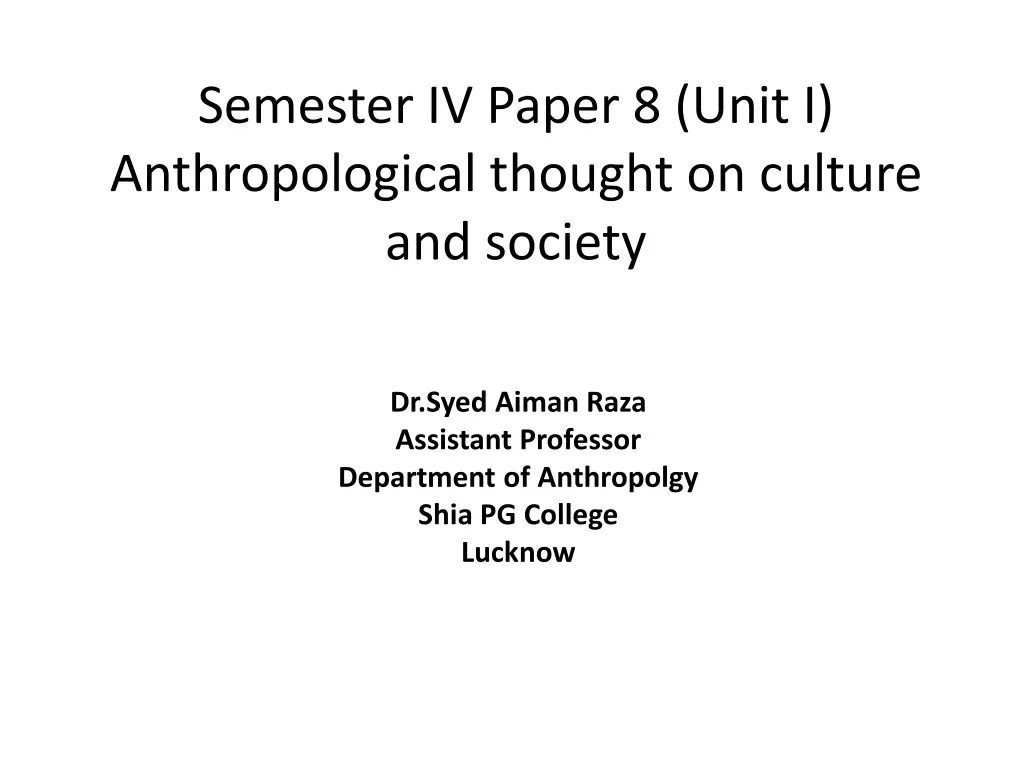
Anthropological Thought on Culture
Explore anthropological perspectives on culture, including definitions, attributes, pluralism, and relativity versus ethnocentrism. Dive into the complexities of learned, shared, transmitted, integrated, and changing cultural aspects. Discover the richness of a diverse society where different cultures coexist, emphasizing the importance of tolerance and understanding in a multicultural world.
Download Presentation

Please find below an Image/Link to download the presentation.
The content on the website is provided AS IS for your information and personal use only. It may not be sold, licensed, or shared on other websites without obtaining consent from the author. If you encounter any issues during the download, it is possible that the publisher has removed the file from their server.
You are allowed to download the files provided on this website for personal or commercial use, subject to the condition that they are used lawfully. All files are the property of their respective owners.
The content on the website is provided AS IS for your information and personal use only. It may not be sold, licensed, or shared on other websites without obtaining consent from the author.
E N D
Presentation Transcript
Semester IV Paper 8 (Unit I) Anthropological thought on culture and society Dr.Syed Aiman Raza Assistant Professor Department of Anthropolgy Shia PG College Lucknow
Definition of Culture One of the best, and most acceptable, early definitions of culture was given by E.B. Tylor (1871) in his book Primitive Culture Tylor says Culture or Civilization, is that complex whole which includes knowledge, belief, art, morals, law, customs, and any capabilities and habits acquired by man as a member of society . Another important definition of Culture is given by Herskovits:- Culture is man made part of the environment . As stated culture has two aspects : 1) Material culture :It includes everything made by man like pen, paper, house, table etc. 2) Non-material culture: It includes everything which is invisible like our thoughts and feelings.
Attributes of Culture 1. Culture is learned Culture is not inherited biologically but it is leant socially by man in a society. It is not an inborn tendency but acquired by man from the association of others, e.g. drinking, eating, dressing, walking, behaving, reading are all learnt by man. 2. Culture is shared Culture is something shared. It is nothing that an individual can passes but shared by common people of a territory. For example, customs, traditions, values, beliefs are all shared by man in a social situation. These beliefs and practices are adopted by all equally. 3. Culture is transmitted Culture is capable of transmitted from one generation to the next. Parents papas cultural traits to their children and in return they pass to their children and son on. It is not transmitted through genes but through language. Language is means to communication which passes cultural traits from one generation to another. 4.Culture is integrated All the cultural aspects are inter-connected with each other. The development of culture is the integration of its various parts. For example, values system is interlinked with morality, customs, beliefs and religion. 5. Culture is changing It remains changing but not static. Cultural process undergoes changes. But with different speeds from society to society and generation to generation.
Plurality of Culture Cultural pluralism is a pattern or a system in which people of different faiths, religions, castes, creeds can all work and live together, retaining proudly their own faith and identity and sharing the common bond of being, either by birth or choice. Plural culture means the co-existence of several sub-cultures within a given society on equal terms. In such a pluralistic culture, the validity of various sub-cultures is recognized.
Cultural relativity and ethnocentrism We live in a multicultural world and obviously the ongoing interaction between different cultures has become necessary. It is true that these interactions are sometimes negative and sometimes positive. As regards this interaction, there are two antithetical concepts namely ethnocentrism and Cultural relativity respectively. Negative type of attitude towards other cultures/ethnic groups is termed ethnocentrism and positive attitude leads to a cultural relativist approach. Ethnocentrism, roughly, is judging another culture through the eyes of your own culture and not trying to see things from their perspective . On the contrary, the cultural relativist insists that every culture must be understood and evaluated in terms of that culture only, which means that there are no better cultures, or worse cultures, but only different ones.
Society The roots of the term society can be traced to the Latin word socius which means companionship or friendship. According to McIver society is a web of social relationships . McIver says society means likeness . Therefore, likeness is an essential prerequisite of society. The sense of likeness was focused in early society on kinship, that is, real or supposed blood relationships. Society is based on the following:- Likeness Interdependance Cooperation
Civilization and Culture The civilization represents a particular type of culture. Civilization is expressed in physical attributes, such as tool making, agriculture, buildings, technology, urban planning, social structure, social institutions, and so forth. Both culture and civilization have been developed by the same human processes. Both are complimentary to each other. Culture needs a civilization for further growth. Civilization needs culture even for its vital force and survival. The two are therefore interdependent.
